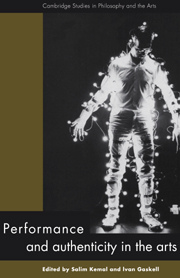Book contents
- Frontmatter
- Contents
- List of Contributors
- Editors' Acknowledgments
- 1 Performance and authenticity
- Part I Performance, religion, and authenticity
- Part II Understanding, performance, and authenticity
- 5 Understanding music
- 6 Understanding music
- 7 Musical performance as analytical communication
- 8 Performance authenticity possible, practical, virtuous
- 9 Why is it impossible in language to articulate the meaning of a work of music?
- Part III Authenticity, poetry, and performance
- Index
8 - Performance authenticity possible, practical, virtuous
Published online by Cambridge University Press: 12 November 2009
- Frontmatter
- Contents
- List of Contributors
- Editors' Acknowledgments
- 1 Performance and authenticity
- Part I Performance, religion, and authenticity
- Part II Understanding, performance, and authenticity
- 5 Understanding music
- 6 Understanding music
- 7 Musical performance as analytical communication
- 8 Performance authenticity possible, practical, virtuous
- 9 Why is it impossible in language to articulate the meaning of a work of music?
- Part III Authenticity, poetry, and performance
- Index
Summary
The word “authentic” is semantically lush, and this has, no doubt, influenced many often heated debates over the status of the early music revival and over any morals to be drawn therefrom for music as such. Some disputes are about the very import of “authenticity,” particularly as regards how thinly or thickly the concept is to be read. Other disputes reflect broader philosophical concerns about knowledge, action, and experience.
In what follows, I am principally interested in some of the purposes to be served by paying special heed to what we have come to know about past performance practice. What survives is a thick reading of “authenticity” which raises no substantive philosophical puzzles, and which makes explicit certain musical values which the pursuit of authenticity exemplifies. Briefly, (a) in many significant ways, a number of efforts to achieve authentic performance are fully practicable if only because they are no more constrained than any of a number of other ordinary efforts at revival, renewal, and restoration; and, (b) as practically achievable, such efforts contribute to our understanding of music-making generally and thereby embody certain musical virtues, even though such efforts do not nor are meant to displace or undermine what we already acceptably do.
If the notion of authenticity developed here seems inordinately tame, that may be due to the brash claims made in its name and immoderate expectations arising therefrom.
- Type
- Chapter
- Information
- Performance and Authenticity in the Arts , pp. 154 - 174Publisher: Cambridge University PressPrint publication year: 1999
- 5
- Cited by

